- Home
- John Kendrick Bangs
The Idiot at Home Page 12
The Idiot at Home Read online
Page 12
XI
AS TO NEW-YEAR'S DAY
It was New-Year's eve, and Mr. and Mrs. Idiot with their old friendswere watching the old year die. The old year had been a fairlysuccessful one for them all, and they were properly mournful over itsprospective demise, but the promise of the new was sufficiently brightto mitigate their sorrow.
"What a sandwich life is, after all!" ejaculated the Idiot.
Mr. Pedagog started nervously. The remark was so idiotic that even itssource seemed to make it inexcusable.
"'I DON'T QUITE CATCH YOUR DRIFT'"]
"I don't quite catch your drift," said he.
"As the man said when an avalanche of snow fell off his neighbor's roofand missed him by an inch," said the Idiot. "Why, just think a moment,Doctor, and my drift will overwhelm you. Look about you and considerwhat we have ourselves demonstrated to-night. If that does not provelife a series of emotional sandwiches, then I don't know what a sandwichis. Twenty minutes ago we were all gladness over the prosperity of theyear gone by. Five minutes ago we were all on the verge of tears becausethe good old year is going the way of all years. An hour from now wewill be joyously acclaiming the new. Two thick slices of joy with a thinslice of grief between."
"Ah!" said Mr. Pedagog. "I see. There is something in the analogy, afterall. The bread of joy and the ham of sorrow, as you might put it; domake up the sum of human existence; but in some cases, my lad, I amafraid you will find there is only one slice of bread to two of ham."
"No doubt," replied the Idiot, "but that does not affect my propositionthat life is a sandwich. If one slice of ham between two slices of breadis a ham sandwich, why is not one slice of bread between two slices ofham a bread sandwich? What is a sandwich, anyhow? The dictionary saysthat a sandwich is something placed between two other things; hence,all things are sandwiches, because there is nothing in the world, theworld being round, that is not between two other things. Therefore, allthings being sandwiches, life is a sandwich, Q. E. D."
"Is life a thing?" demanded Mr. Pedagog.
"Certainly," said the Idiot. "And a mighty good thing, too. If you don'tbelieve it look the word thing up in the dictionary. All things arethings."
"But," continued the Schoolmaster, his old spirit of antagonism risingup in his breast, "granted that life is a thing, what is it between sothat it becomes a sandwich?"
"The past and the future," said the Idiot. "It is a slice of theimmediate between a slice of past and one of future."
Mr. Pedagog laughed.
"You are still the same old Idiot," he said.
"Yes," said the Idiot. "Gibraltar and I and Truth are the threeunchangeable things in this life, and that's why I am so happy. I'm insuch good company. Gibraltar and Truth are good enough companions foranybody."
Meanwhile Mollie and Tommy, who had been allowed to sit up upon thisrare occasion, stirred uneasily.
"Ith I a thandwich, popper?" said the little girl, sleepily, raising herhead from her father's shoulder and gazing into his eyes.
"Yes, indeed, you are," said her father, giving her an affectionatesqueeze. "A sugar sandwich, Mollie. You're really good enough to eat."
"Well, I'd rather be a pie," put in Tommy; "an apple pie."
"Very well, my son," returned the Idiot. "Have your own way. Henceforthbe a pie if you prefer--an apple pie. But may I ask why you express thispreference?"
"Oh, because," said Tommy, "if I'm to be an apple pie somebody's got tofill me chock-full of apple sauce."
"The son of his father," observed Mr. Whitechoker.
"I think it is a pity," Mrs. Pedagog put in at this point, "that some ofthe good old customs of the New Year have gone out."
"As to which, Mrs. Pedagog?" asked the Idiot.
"Well, New-Year's calling particularly," explained the lady. "It is nolonger the thing for people to make New-Year's calls, and I must confessI regret it. It used to be a great pleasure to me in the old days toreceive the gentlemen--my old friends, and relatives, and boarders."
"Why distinguish between your old friends and your boarders, Mrs.Pedagog?" interrupted the Idiot. "They are synonymous terms."
"They are now," said the good lady, "but--ah--they weren't always. Iused sometimes to think you, for instance, didn't like me as much as youmight."
"I didn't dare," explained the Idiot. "If I'd liked you as much as Imight I'd have told you so, and then Mr. Pedagog would have got jealousand there'd have been a horrid affair."
The lady smiled graciously, and Mr. Pedagog threw a small paper pelletat the Idiot.
"I'm much obliged to you for holding off, Idiot," he said. "I don't knowwhere I'd have been to-day if you'd got in ahead of me. Mrs. Pedagog hasalways had a soft spot in her heart for you."
"I've got the other spot," said the Idiot, "and a pair of aces are hardto beat in pairs; but I think I voice Mrs. Pedagog's sentiments in thematter, Mr. Pedagog, when I say that she and I would always have beenglad to see you every other New-Year's day if I had been the fortunatewinner of her hand."
"And Mr. Pedagog and I would have been glad to see you and Mrs. Pedagogin the sandwich years," said Mrs. Idiot to her husband; and then,turning to the Schoolmaster, added, "Wouldn't we, Mr. Pedagog?"
"No, madame," returned Mr. Pedagog, courteously. "You might have been,but I would not. If I had married you I could never have seen any oneelse with pleasure. I should have kept my eyes solely for you."
"John!" cried Mrs. Pedagog, arching her eyebrows.
"Pleasantry, my dear--mere pleasantry," returned the Schoolmaster,tapping his fingers together and smiling sweetly upon Mrs. Idiot.
"You didn't finish, Mrs. Pedagog," said the Idiot. "You were telling ushow you used to enjoy New-Year's calling before it went out."
"Yes," replied Mrs. Pedagog. "It was charming. I used positively tolook forward to its coming with delight. We women, Mr. Idiot, found theold custom very delightful."
"But the men, Mrs. Pedagog," said the Idiot, "did you ever think ofthem?"
"What else did we think of? What else is there for a woman to thinkabout?" replied Mrs. Pedagog.
"Jane!" cried Mr. Pedagog.
"_Pleasantry, my dear--mere pleasantry_," returned Mrs. Pedagog,frigidly. And Mr. Pedagog lit a cigar. It is not always pleasant to bequoted.
"Still," said the Idiot, "you thought of men only as creatures of themoment--"
"Entirely," said Mrs. Pedagog.
"And not as creatures of the week following," said the Idiot.
"What has that to do with it?" asked Mrs. Pedagog.
"Much--from the man's stand-point," returned the Idiot. "His digestionwas butchered to make a woman's holiday. Take myself as an example. Iused to make New-Year's calls; and to get through with my list bymidnight, I had to start in at nine o'clock in the morning."
"Nine o'clock is not so early," said Mr. Whitechoker.
"It's early for cake and pickled oysters," said the Idiot. "And forchicken salad and wedding-cake, and for lemonade and punch, and forlobster and egg-nog, and for ice-cream and _pate-de-foie-gras_."
"H'm!" said Mr. Pedagog, reflectively. "That's true."
"Quite so," observed Mr. Whitechoker, brushing off his vest, upon whichthe ashes of his cigar had rested. "Especially for the punch."
"There was no punch in my house," said Mrs. Pedagog. "Indeed, I alwaysserved a very simple luncheon. We did have chicken salad, of course, butthe chicken was good and the salad was crisp--"
"I'd swear to it," said the Idiot.
"And we had egg-nog, but there was more egg than nog in it--"
"Again I'd swear to it," said the Idiot, smacking his lips.
"And as for the lobsters, nobody ever complained--"
"He'd have been a lobster himself who would," said the Idiot. "But thatdoes not prove that no one ever suffered."
"And as for the pickled oysters, no one ever suffered from them that Iknew of," continued the good lady. "They are harmless eaten inmoderation."
"'I FELT AS IF I HAD SWALL
OWED AS OVERSHOE'"]
"Exactly right," cried the Idiot. "No gentleman would ever complain ofpickled oysters, even if they were made of inferior rubber, eaten inmoderation. Yet I recall in my own experience a pickled oyster of mostimpressive quality. He was not a pickled oyster of the moment. He wasthe Admiral Dewey of pickled oysters. In appearance he resembled everyother pickled oyster I ever met, but--well, he kept me in a state ofworry for a month. Just eating him alone was eating pickled oysters inimmoderation. I felt as if I had swallowed an overshoe. He was acharming pickled oyster, Mrs. Pedagog, and he was devoted to me, but heinvolved me in complications alongside of which the Philippine questionis child's play. If a New-Year's caller could have confined hisattentions to the ladies he met no harm would have come to him, but hecouldn't, you know. The day was one continuous round of effort andindigestibles. What a man got at your house and had to eat merely toshow his appreciation of your hospitality was all right and wholesome.Your lobster and egg-nog could do him no harm, but he couldn't stop withyours; he had to continue, and consume lobsters and egg-nog everywhereelse and all day long. The day resolved itself into a magnificent gorgealongside of which that of Niagara seems like a wagon-rut. It finallycame down to the point where either man or the custom had to die, andman being selfish, the custom went. Did you ever consider exactly howmuch indigestible food an amiable, well-meaning person had to consume ina round of, say, three dozen calls, Mrs. Pedagog?"
Mr. Brief nodded his approval. "Now you've struck it," he said. "I'vebeen there, Idiot."
"I must confess," said Mrs. Pedagog, "that I never looked into thatquestion."
"Well, I'll tell you," the Idiot resumed. "The last time I madeNew-Year's calls I figured it out for the doctor the next morning, andas I recall the statistics, in the course of that day I ate one hundredand twenty-nine pickled oysters, thirteen plates of chicken salad, sevenplates of lobster salad, five plates of mulled sardines, twenty-threeplates of ice-cream, four hundred and sixty-three macaroons,eighty-seven sandwiches ranging from lettuce and ham to chicken andpotted goose-liver, enough angel-cake to feed all the angels there areand two more, sixteen Welsh rarebits that were being made just as Ihappened in, and crystallized ginger and salted almonds and marrons tothe extent of about eighteen pounds."
"Mercy!" cried Mrs. Pedagog.
"Say, pa, where was I then?" asked Tommy, his eyes glittering withdelight.
"You were eating green cheese on the moon, Tommy," said the Idiot.
"Wisht I'd been with you," said Tommy. "Must o' been better than bein' apie."
"And all of these things," continued the Idiot, with a wink at his son,"I washed down with six gallons of lemonade, nineteen cups of coffee,eighteen cups of tea, and a taste of claret punch."
"And how about the egg-nog?" asked the Bibliomaniac, slyly.
"I judge there were about six crates of eggs in it," said the Idiot. "Inever had the nerve to estimate the nog-end of it."
"What did the doctor say when you told him all that?" asked Mrs.Pedagog.
The Idiot chuckled. "What did he say?" he cried. "Why, I should thinkyou could guess. He blamed it all on the Welsh rarebits, but he thoughthe could get me into shape again in time for the next New Year. I'venever been the same man since."
"Well, the way I look at it," said Mrs. Pedagog, "is that it is a greatpity that women must be deprived of a function that gives them pleasurebecause the men make pigs of themselves."
"But you don't understand, Mrs. Pedagog," the Idiot persisted. "I grantyou that the man who eats all that makes a pig of himself, but he has nochoice. He can't help himself. When a charming hostess insists, he'd bea greater pig if he refused to partake of her hospitality. The custominvolved an inevitable sacrifice of man's digestion upon the altar ofwoman. That's all there was about it. If it could have been arranged sothat a man could take a hamper about with him and stow all the cakes andsalads and other good things away in that, and eat them later as hehappened to need or want them, instead of in his own inner self, thegood old custom might have been preserved, but that is impossible inthese conventional days."
"You needn't have eaten it all," put in Mrs. Idiot. "You could havepretended to eat it and put it down somewhere."
"'I FOUND EIGHT SANDWICHES AND A PINT OF SALTEDALMONDS'"]
"'THEY WERE FOUND SOME DAYS LATER WHEN THE ROOM WAS PUTIN ORDER'"]
"I know that, my dear. I didn't even on that occasion eat it all--I onlyate what I told you. I found eight sandwiches and a pint of saltedalmonds in my coat-tail pocket the next morning, which I managedsurreptitiously to hide away while my hostesses were getting mesomething else, and in one place, while nobody was watching me, I hid ahalf-dozen pickled oysters under a sofa, where I suppose they were foundsome days later when the room was put in order."
As the Idiot spoke the clock struck twelve, and the guests all rose up.
"Here's to the New Year!" said Mr. Pedagog.
"Not yet," interposed the Idiot. "That's only a signal for the Welshrarebits to be brought in. I've sworn them off for the New Year, but Ihaven't for the old. The clock is a half-hour fast."
"No, my dear," said Mrs. Idiot. "It was, but I put it back. It's exactlyright now."
"Then," said the Idiot, "I join you in the toast, Mr. Pedagog. Here's tothe New Year: may it bring joy to everybody. Meanwhile may it bring alsothe Welsh rarebits."
"I thought you'd sworn off," suggested Mr. Pedagog.
"So I had," replied the Idiot, "but circumstances over which I have nocontrol force me to postpone my reformation for another twelve months.If they had been served at half-past eleven I should have stuck to myresolve; as they have been delayed until twelve-one I cannot do lessthan eat them. I do not believe in wilful waste; and besides, it isquite as much the duty of the host to consume the good things he placesbefore his guests as it is for the guests to partake. I can wait a year,I think, without wholly ruining what little digestion my former devotionto New-Year's calling has left me. Gentlemen, I propose the ladies: Maytheir future be as golden as this rarebit; and for the men, may theyalways be worthy to be the toast upon which that golden future may restwith the certainty born of confidence."
And the guests fell to and ate each a golden buck to the New Year--allsave Mollie and Tommy. These two important members of the household wentup to their little beds, but just before going to sleep Tommy calledthrough the door to his little sister:
"Mollie!"
"Yeth!"
"Want to play a game with me to-morrow?"
"Yeth!"
"Well, you get a cake and a pie and some gingersnaps and a lot of applesand some candy and we'll play New-Year's calls."
"Splendid!" lisped Mollie. "You'll call on me?"
"Yes," said Tommy; "and all you'll have to do will be to force food onme."
And they soon passed into the land of dreams.

 The Genial Idiot: His Views and Reviews
The Genial Idiot: His Views and Reviews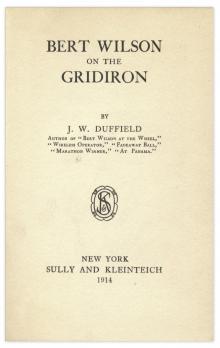 Bert Wilson, Marathon Winner
Bert Wilson, Marathon Winner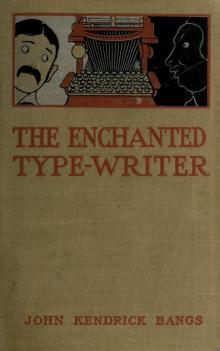 The Enchanted Typewriter
The Enchanted Typewriter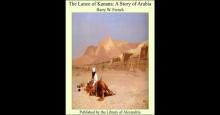 The Lance of Kanana: A Story of Arabia
The Lance of Kanana: A Story of Arabia Coffee and Repartee
Coffee and Repartee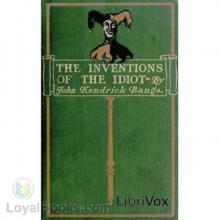 The Idiot at Home
The Idiot at Home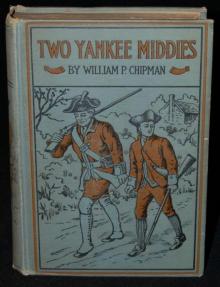 Budd Boyd's Triumph; or, The Boy-Firm of Fox Island
Budd Boyd's Triumph; or, The Boy-Firm of Fox Island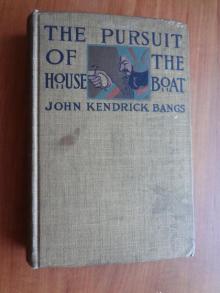 The Pursuit of the House-Boat
The Pursuit of the House-Boat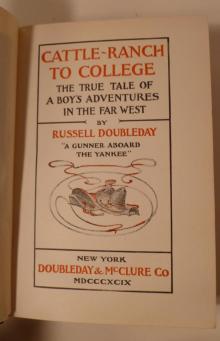 Cattle-Ranch to College
Cattle-Ranch to College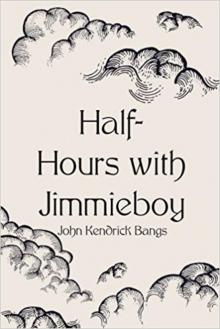 Half-Hours with Jimmieboy
Half-Hours with Jimmieboy Bikey the Skicycle and Other Tales of Jimmieboy
Bikey the Skicycle and Other Tales of Jimmieboy Toppleton's Client; Or, A Spirit in Exile
Toppleton's Client; Or, A Spirit in Exile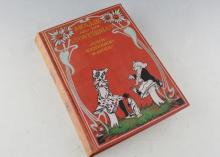 Mollie and the Unwiseman
Mollie and the Unwiseman The Inventions of the Idiot
The Inventions of the Idiot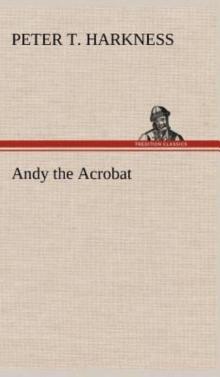 Andy the Acrobat
Andy the Acrobat In Camp With A Tin Soldier
In Camp With A Tin Soldier Angel over the Right Shoulder
Angel over the Right Shoulder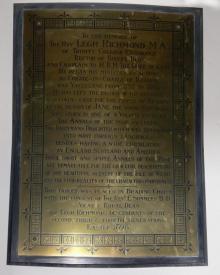 Annals of the Poor
Annals of the Poor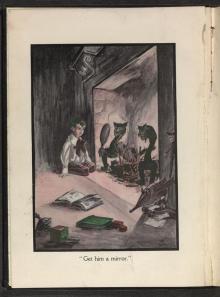 Andiron Tales
Andiron Tales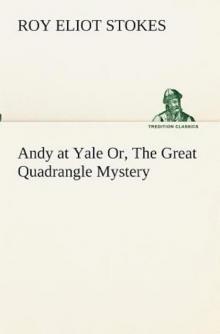 Andy at Yale
Andy at Yale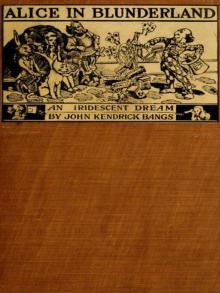 Alice In Blunderland
Alice In Blunderland